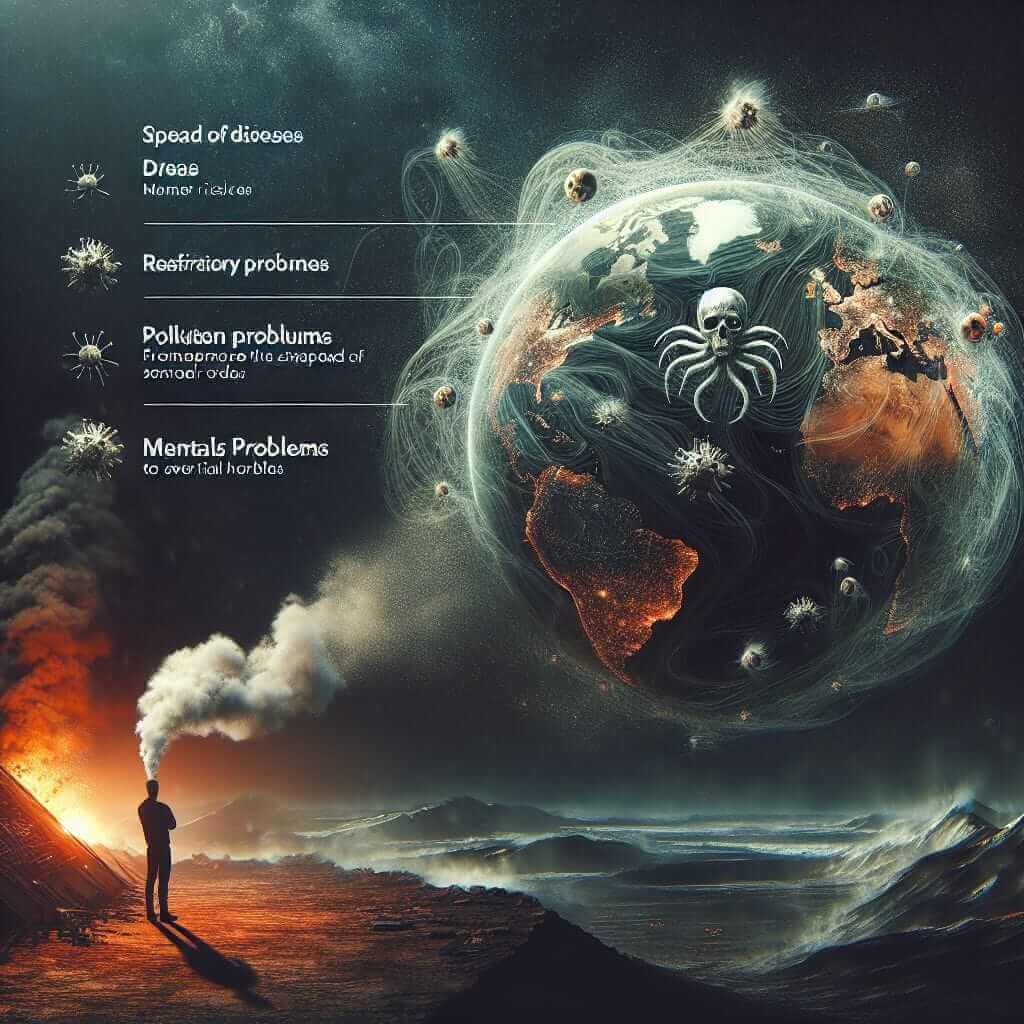The IELTS Reading test assesses a range of reading skills, including the ability to read for gist, detail, and main ideas. As climate change becomes an increasingly important global issue, it often appears in various settings, including educational materials and exams. Understanding how climate change affects human health is crucial, not only for your general knowledge but also for your IELTS preparation. This topic is prevalent and has appeared in past IELTS exams, making it a vital area to focus on. This article aims to provide an in-depth reading practice themed around the “Effects of climate change on human health,” aiding your preparation for the IELTS Reading test.
Reading Passage: Effects of Climate Change on Human Health
Reading Text (Medium Text)
Climate change is a pressing global issue that is increasingly recognized for its far-reaching impacts on human health. The rise in global temperatures, shifting weather patterns, and increased frequency of extreme weather events have significant implications for public health. This reading text discusses several ways climate change affects human health, including the spread of infectious diseases, respiratory issues, and the mental health impacts of climate-related disasters.

Spread of Infectious Diseases
Climate change has dramatically influenced the spread of infectious diseases. Warmer temperatures and altered precipitation patterns create ideal breeding grounds for disease-carrying vectors such as mosquitoes, ticks, and rodents. Diseases such as malaria, dengue fever, and Lyme disease are becoming more prevalent as these vectors expand their habitats into new regions previously inhospitable to them. Additionally, waterborne diseases like cholera are exacerbated by flooding and poor water management associated with climate change.
Respiratory Issues
In addition to infectious diseases, climate change exacerbates respiratory problems. Increased levels of carbon dioxide contribute to higher ground-level ozone concentrations, which can lead to and worsen chronic respiratory conditions like asthma and chronic obstructive pulmonary disease (COPD). Wildfires, becoming more frequent due to prolonged droughts and higher temperatures, release large quantities of particulate matter and toxic gases into the air, further aggravating respiratory issues.
Mental Health Impacts
Another critical but often overlooked area is the impact of climate change on mental health. Natural disasters, such as hurricanes, floods, and wildfires, not only result in immediate physical injuries but also have lasting psychological effects. Survivors of these events often experience trauma-related disorders, including post-traumatic stress disorder (PTSD), anxiety, and depression. The uncertainty and fear about future climate events can also contribute to chronic stress and mental health challenges.
Conclusion
In conclusion, the health impacts of climate change are complex and multifaceted. By spreading infectious diseases, exacerbating respiratory conditions, and affecting mental health, climate change poses a significant risk to global public health. Understanding these impacts is crucial for developing effective public health strategies and finding innovative solutions to mitigate these effects.
IELTS Reading Practice Questions
Question Type: Multiple Choice
-
Which of the following is NOT mentioned as an effect of climate change on human health?
- a) The spread of infectious diseases
- b) Improvement in public health infrastructure
- c) Respiratory issues
- d) Mental health impacts
-
According to the text, which of the following diseases has become more prevalent due to climate change?
- a) Diabetes
- b) Dengue fever
- c) Heart disease
- d) Cancer
Question Type: True/False/Not Given
- Climate change has led to a decrease in the frequency of wildfires.
- Surviving a climate-related natural disaster often results in long-term psychological issues.
Question Type: Summary Completion
Complete the summary using words from the box.
Climate change significantly affects human health by influencing the spread of infectious diseases, exacerbating issues, and causing health impacts. Warmer temperatures and altered precipitation patterns lead to the spread of diseases such as malaria and dengue fever. Wildfires and higher ground-level ozone concentrations worsen problems, while natural disasters contribute to mental health challenges like ___.
Words: respiratory, mental, infectious, PTSD, drought
Answers and Explanations
- b) Improvement in public health infrastructure
- b) Dengue fever
- False
- Explanation: Wildfires are said to be increasing in frequency due to climate change.
- True
- Explanation: The text mentions that natural disasters have lasting psychological effects leading to trauma-related disorders.
Summary Completion Answers
Climate change significantly affects human health by influencing the spread of infectious diseases, exacerbating respiratory issues, and causing mental health impacts. Warmer temperatures and altered precipitation patterns lead to the spread of infectious diseases such as malaria and dengue fever. Wildfires and higher ground-level ozone concentrations worsen respiratory problems, while natural disasters contribute to mental health challenges like PTSD.
Common Mistakes and Tips
Common Mistakes
- Not skimming properly: Many test-takers fail to skim the passage first to get a general understanding. This can lead to misinterpretation of questions.
- Misidentifying key information: Ensure you identify and underline key information and keywords as you read.
Tips for Higher Scores
- Develop skimming and scanning skills: These are crucial for locating information quickly.
- Practice regularly: Use articles on climate change for everyday practice.
- Enhance vocabulary: Focus on environmental and health-related vocabulary to better understand passages and questions.
Vocabulary
- Exacerbate (v) /ɪɡˈzæsərˌbeɪt/: To make a problem or a situation worse.
- Respiratory (adj) /ˈrɛspərəˌtɔri/: Related to breathing or the lung system.
- Prevalent (adj) /ˈprɛvələnt/: Widespread in a particular area at a particular time.
- Vectors (n) /ˈvɛktərz/: Organisms that transmit disease or parasites from one animal or plant to another.
Grammar Focus
Complex Sentences
Utilizing complex sentences can help convey detailed information effectively. Consider the sentence structure:
- Although climate change poses significant risks, it also presents opportunities for innovation in public health (Complex sentence using “although” and “it also”).
Final Advice
Regular practice, coupled with a thorough understanding of how climate change affects human health, will strengthen your reading skills for the IELTS. Incorporate a variety of question types such as multiple choice, True/False/Not Given, and summary completion to ensure a comprehensive preparation. Stay consistent and keep enhancing your vocabulary and grammar for the best results.